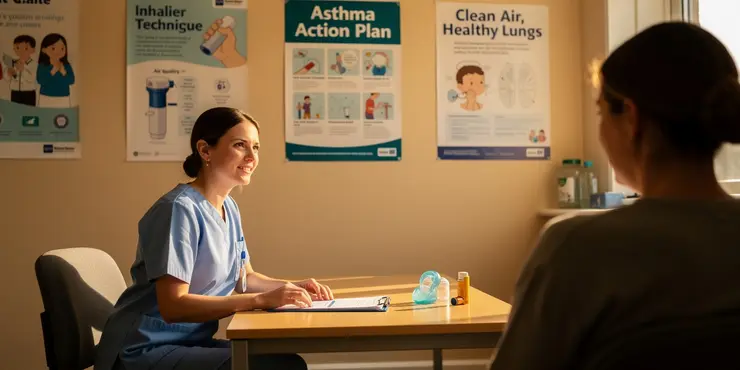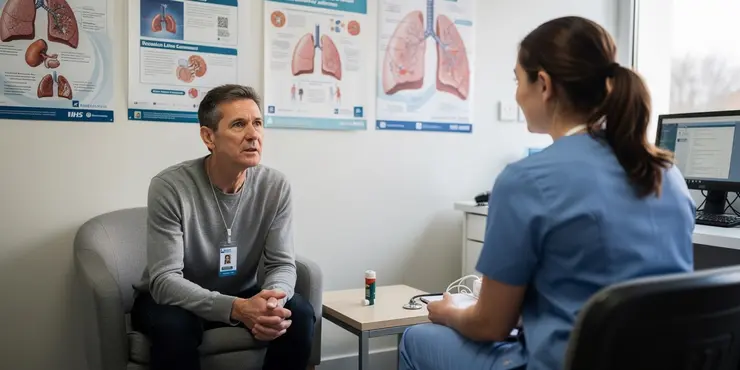
Find Help
More Items From Ergsy search
-

Are there different types of asthma?
Relevance: 100%
-

What is Asthma?
Relevance: 74%
-

Are inhalers the only treatment for asthma?
Relevance: 71%
-

What causes asthma?
Relevance: 70%
-

Can asthma be cured?
Relevance: 70%
-

Is asthma a serious condition?
Relevance: 69%
-

Can asthma be fatal?
Relevance: 67%
-

An Asthma Explainer with Dr Katherine Hickman
Relevance: 67%
-

How is asthma treated?
Relevance: 67%
-

How is asthma diagnosed?
Relevance: 67%
-

What are the common symptoms of asthma?
Relevance: 66%
-

What is an asthma action plan?
Relevance: 65%
-

Can stress cause asthma symptoms?
Relevance: 65%
-

Can diet affect asthma?
Relevance: 65%
-

What triggers asthma attacks?
Relevance: 64%
-

Can children outgrow asthma?
Relevance: 64%
-

Can exercise trigger asthma symptoms?
Relevance: 63%
-

Is there a link between hay fever and asthma?
Relevance: 62%
-

How can asthma attacks be prevented?
Relevance: 62%
-

How does air pollution affect asthma?
Relevance: 61%
-

Is asthma more common in certain age groups?
Relevance: 60%
-

How often should someone with asthma see a doctor?
Relevance: 60%
-

Can dust mites cause asthma and eczema?
Relevance: 56%
-

Rise in Childhood Asthma Linked to Air Pollution in Urban Areas
Relevance: 55%
-

What are some common pollutants that affect asthma sufferers in urban areas?
Relevance: 55%
-

Are there mobile apps to track air quality and its impact on asthma?
Relevance: 55%
-

Where can I find information on air pollution and its effect on Asthma for my local area?
Relevance: 53%
-

UK Study Links Poor Air Quality to Increased Asthma Cases in Urban Areas
Relevance: 52%
-

Where can I find research studies on air pollution and asthma in my area?
Relevance: 51%
-

How to retrain your breathing | Part 2 | Asthma, long covid or breathlessness
Relevance: 51%
-

What are the main types of eczema?
Relevance: 40%
-

What local organizations provide information on air pollution and asthma?
Relevance: 40%
-

What local organizations provide information on air pollution and asthma?
Relevance: 39%
-

How can I reduce my exposure to air pollution if I have asthma?
Relevance: 39%
-

Where can I find general information about air pollution and asthma?
Relevance: 38%
-
What is the difference between type 1 and type 2 diabetes?
Relevance: 38%
-

Type 1 Diabetes supporting adults to manage Type 1 diabetes
Relevance: 35%
-

Is Type 2 Diabetes hereditary?
Relevance: 35%
-
What is type 1 diabetes?
Relevance: 35%
-

What is type 1 diabetes?
Relevance: 35%
Are There Different Types of Asthma?
Asthma is a common respiratory condition that affects millions of people worldwide, including many in the UK. It is characterised by inflammation and narrowing of the airways, which can lead to symptoms such as wheezing, coughing, chest tightness, and shortness of breath. However, not all asthma is the same, and there are different types of asthma, each with its own triggers and treatment options. Understanding these differences is important for managing the condition effectively.
Allergic Asthma
Allergic asthma is one of the most common forms of asthma and is triggered by allergens such as pollen, dust mites, mould, and pet dander. People with allergic asthma often have other allergic conditions like hay fever or eczema. The immune system overreacts to these allergens, causing inflammation in the airways. Treatment often includes avoiding allergens, using inhalers, and, in some cases, allergy medications or immunotherapy.
Non-Allergic Asthma
Non-allergic asthma, also known as intrinsic asthma, is not triggered by allergens. Instead, it may be triggered by factors such as stress, exercise, cold air, dry air, smoke, and viral infections. This form of asthma can be more challenging to manage since the triggers are less predictable. The treatment typically involves bronchodilators and corticosteroids to reduce airway inflammation.
Exercise-Induced Bronchoconstriction
Sometimes referred to as exercise-induced asthma, this type occurs during or after physical activity. Symptoms include chest tightness, cough, and shortness of breath. People with exercise-induced bronchoconstriction might still participate in physical activities but may need to use a reliever inhaler before exercise as a preventative measure. It is important to warm up adequately and avoid exercising in very cold or dry air environments.
Occupational Asthma
Occupational asthma is caused by exposure to substances in the workplace. These can include chemicals, dust, gases, or fumes that cause respiratory irritation. Symptoms may only appear while at work and may improve during weekends or holidays. Managing occupational asthma often involves identifying and reducing exposure to triggers. In some cases, changing jobs may be necessary to prevent ongoing symptoms.
Aspirin-Induced Asthma
This type of asthma is triggered by aspirin and other non-steroidal anti-inflammatory drugs (NSAIDs). It often occurs in adults and may be associated with nasal polyps and sinusitis. People with aspirin-induced asthma need to avoid aspirin and NSAIDs and may use medications such as leukotriene receptor antagonists to manage their symptoms.
In conclusion, understanding the different types of asthma is crucial for effective management of the condition. Each type may require a specific treatment approach, and being aware of triggers can help individuals with asthma avoid flare-ups and maintain a good quality of life.
Are There Different Types of Asthma?
Asthma is a breathing problem that many people have all over the world. In the UK, lots of people have it too. Asthma makes your airways, or the tubes you breathe through, narrow and swell. This can make you wheeze, cough, feel a tight chest, or struggle to breathe. But not everyone with asthma has it the same way. There are different types of asthma, and each type has different things that make it worse. Knowing these different types can help you manage asthma better.
Allergic Asthma
Allergic asthma is a common kind of asthma. It happens when your body reacts to things like pollen, dust mites, mold, or animal fur. People with this type of asthma might also have other allergies like hay fever or itchy skin. Your body thinks these things are bad, so it causes swelling in your airways. To manage it, try to stay away from things you're allergic to. Use your inhalers and maybe take allergy medicine if your doctor says so.
Non-Allergic Asthma
Non-allergic asthma is different because it isn't caused by allergies. Things like stress, exercise, cold air, dry air, smoke, or getting sick can make it worse. These triggers can be hard to predict. To manage it, you might use special inhalers that help open your airways and reduce swelling.
Exercise-Induced Bronchoconstriction
This type of asthma happens when you exercise or move a lot. It can make your chest feel tight, make you cough, or have trouble breathing. People can still exercise but might need an inhaler before they start. Warming up first and not exercising in really cold or dry places can help.
Occupational Asthma
Job-related asthma happens because of things you breathe in at work. This can be chemicals, dust, smoke, or gas. Symptoms might only show up while at work and get better on weekends or holidays. Finding out what causes it and staying away from those things can help. Sometimes, changing jobs might be needed for better health.
Aspirin-Induced Asthma
This asthma is caused by taking aspirin or similar pain medicines. It often happens in adults and might come with nose problems and sinus infections. People with this type of asthma should avoid aspirin and similar medicines. They can take other medicine that their doctor advises to manage symptoms.
In conclusion, knowing about the different types of asthma helps people manage it better. Each type needs different care, and avoiding things that trigger asthma can help people feel good and stay healthy.
Frequently Asked Questions
What is asthma?
Asthma is a chronic respiratory condition characterized by inflammation and narrowing of the airways, leading to breathing difficulties.
Are there different types of asthma?
Yes, there are different types of asthma, each with varying triggers and symptoms.
What is allergic asthma?
Allergic asthma is triggered by allergens such as pollen, dust mites, pet dander, or mold.
What is non-allergic asthma?
Non-allergic asthma is triggered by factors not related to allergies, like stress, exercise, cold air, or respiratory infections.
What is exercise-induced bronchoconstriction?
Exercise-induced bronchoconstriction (often called exercise-induced asthma) occurs when physical activity triggers asthma symptoms.
What is occupational asthma?
Occupational asthma is caused by allergens or irritants present in the workplace, such as chemicals, gases, or dust.
What is nocturnal asthma?
Nocturnal asthma is when asthma symptoms worsen at night, potentially due to factors like lying down, cooler air, or hormonal changes.
What is cough-variant asthma?
Cough-variant asthma is characterized by a persistent cough without the typical wheezing associated with other forms of asthma.
Can asthma be triggered by stress?
Yes, stress and emotional factors can trigger asthma symptoms or exacerbate the condition.
How is asthma diagnosed?
Asthma is typically diagnosed through a combination of medical history, physical examination, and lung function tests.
Can children outgrow asthma?
Some children may see a reduction in asthma symptoms as they age, but asthma can also persist into adulthood.
What is severe asthma?
Severe asthma is a form where symptoms are persistent and difficult to control despite high-dose medication.
How is asthma treated?
Asthma is usually managed with inhaled medications, such as short-acting bronchodilators and inhaled corticosteroids.
What role do genetics play in asthma?
Genetics can influence your likelihood of developing asthma, as it often runs in families.
Can environmental factors affect asthma?
Yes, environmental factors like air pollution, tobacco smoke, and exposure to allergens can affect asthma.
What lifestyle changes can help manage asthma?
Lifestyle changes like avoiding triggers, maintaining a healthy weight, and regular exercise can help manage asthma.
Is there a cure for asthma?
There is no cure for asthma, but it can be effectively managed with proper treatment and lifestyle adjustments.
Can smoking worsen asthma?
Yes, smoking and exposure to secondhand smoke can worsen asthma symptoms and reduce lung function.
What is the difference between asthma and COPD?
Asthma is usually reversible with treatment, while COPD (chronic obstructive pulmonary disease) is a progressive disease with similar symptoms that is often linked to smoking.
Can asthma affect mental health?
Asthma can affect mental health, as living with a chronic condition can lead to anxiety and stress.
What is asthma?
Asthma is a problem that makes it hard to breathe.
People with asthma might cough, wheeze, or feel their chest get tight.
It happens because the airways in the lungs become narrow.
Tools and Tips:
- Keep an inhaler close. It helps you breathe better.
- Tell a grown-up if you feel it's hard to breathe.
- Try to stay away from things that can make asthma worse, like smoke or dust.
Asthma is a long-term lung problem. It makes the tubes in the lungs swell up and get smaller, which makes it hard to breathe.
Are there different kinds of asthma?
Yes, there are different kinds of asthma. Asthma is when it's hard to breathe.
Different Kinds:
- Allergic Asthma: This happens when things like dust or pollen make it hard to breathe.
- Non-allergic Asthma: This happens from things like exercise or cold air.
- Childhood Asthma: This is when kids have asthma.
If you have asthma, it helps to see a doctor. They can help you find ways to breathe better. Techniques like using an inhaler or breathing exercises can be useful.
Yes, there are different kinds of asthma. Each one can start from different things and can make you feel different symptoms.
What is allergic asthma?
Allergic asthma is a breathing problem. It happens when you are around things you are allergic to, like dust or pollen. Your chest can feel tight, and it might be hard to breathe.
When people with allergic asthma breathe in something they are allergic to, their body reacts. This can make it hard to get air in and out of the lungs. Some people might start to cough or wheeze. Others might feel their chest is tight.
If you have allergic asthma, it is important to know what you are allergic to. Try to stay away from those things to feel better. Using an inhaler can help you breathe if you have an asthma attack.
Talking to a doctor is also a good idea. They can help you find out what you are allergic to and give you medicine to help with your breathing.
Using pictures or videos can help you understand more about allergic asthma. A support group can also be helpful to talk to others with asthma.
Allergic asthma happens when things like pollen, dust mites, pet hair, or mold make it hard to breathe.
What is non-allergic asthma?
Non-allergic asthma is a type of asthma.
This means it is hard to breathe sometimes.
But it is not because of allergies like dust or pollen.
Triggers can include things like stress, cold air, or exercise.
If you have non-allergic asthma, a doctor can help you.
Tips:
- Breathe slowly and deeply when it feels hard to breathe.
- Try to stay calm and relax your body.
- Ask a grown-up or doctor if you need medicine or a special plan.
- Using inhalers might help.
Non-allergic asthma happens when things like stress, exercise, cold air, or a cold make it hard to breathe. This is different from asthma caused by allergies.
What happens to your breathing when you exercise?
Sometimes, when people exercise, their breathing can get tight or hard. This is called exercise-induced bronchoconstriction. It means the airways in the lungs get smaller for a little while.
Here are some things that might help:
- Warm up before you start exercising.
- Breathe through your nose, not your mouth.
- Take breaks if you feel tired.
- Talk to a doctor if you often have trouble breathing.
Exercise-induced bronchoconstriction happens when doing exercise makes it hard to breathe. People might call this exercise-induced asthma.
What is occupational asthma?
Occupational asthma is when your breathing is affected by something at work.
You might start coughing, wheezing, or feel like you can't breathe easily. This happens because of dust, chemicals, or other things you breathe in while working.
If you think work is making your asthma worse, talk to your doctor.
Try using pictures or videos to help understand more. A doctor can also explain things slowly and answer questions.
Work asthma is when something at your job makes it hard to breathe. This could be because of things like chemicals, gas, or dust.
What is nighttime asthma?
Nighttime asthma is when your chest feels tight or you cough and find it hard to breathe while you are sleeping.
Here are some tips to help:
- Use a special pillow to hold your head up.
- Try to sleep on your left side.
- Take your asthma medicine before going to bed.
- If you wake up, sit up and breathe slowly.
Having asthma at night is called nocturnal asthma. This is when breathing problems get worse when it is dark. This can happen because you are lying down, it is cooler at night, or because of changes in your body.
What is cough-variant asthma?
Cough-variant asthma is a kind of asthma where the main sign is coughing.
Coughing happens a lot and won't go away.
It can happen when you exercise, laugh, or breathe cold air.
If you think you have cough-variant asthma, talk to a doctor. They can help you.
Helpful Tips:
- Use pictures to show how you feel.
- Ask someone to read with you.
- Take breaks if it is hard to keep reading.
Cough-variant asthma means having a cough that doesn't go away. It is different because there is no noisy breathing, called wheezing, like in other types of asthma.
Can stress cause asthma?
Yes, feeling worried or upset can make asthma symptoms worse.
How do doctors know if you have asthma?
Doctors find out if someone has asthma by asking about their health, checking their body, and seeing how well their lungs work.
Do kids stop having asthma when they get older?
As children grow up, some might have fewer asthma problems. But sometimes, asthma stays as they become adults. Here are some tips that might help:
- Use a picture chart to track breathing.
- Try breathing exercises with a grown-up.
- Use a diary to write down when asthma gets better or worse.
What is severe asthma?
Severe asthma is a very strong kind of asthma. Asthma makes it hard to breathe. People with severe asthma need extra help and medicine.
If you have severe asthma, it's important to see a doctor often. Using things like inhalers can help you breathe better.
Severe asthma is when breathing problems are really bad and do not get better, even when you take lots of medicine.
How do we help someone with asthma?
Asthma can make it hard to breathe.
To help people with asthma, we have special medicines. These medicines make breathing easier.
Some people take their medicine every day. This helps keep asthma away.
Others have a special inhaler. They use it when they feel their asthma is bad. The inhaler makes their airways open up so they can breathe better.
If you have asthma, it is important to talk to a doctor. They can help you find the right medicine.
Parents, teachers, and friends can help too. They can remind you to use your inhaler and stay away from things that make your asthma worse, like smoke or dust.
Remember, always follow the doctor's advice and keep your medicine with you.
People with asthma can breathe better with special medicines. These medicines are breathed in using an inhaler. Two common types are:
- Quick relief inhalers that help right away when breathing is hard.
- Everyday inhalers that help keep asthma under control.
If you find reading hard, you can use tools like audiobooks or ask someone to help you. Practice reading a little every day to get better.
How do genes affect asthma?
Your genes can affect whether you get asthma. This means if your family members have asthma, you might get it too.
Can things around us make asthma worse?
Asthma is a condition that affects breathing.
Sometimes, things in the air can make asthma worse.
These things can be smoke, dust, or pollen from flowers.
It helps to keep the air clean around you.
You can use an air cleaner or wear a mask to help.
Yes, things in the environment like dirty air, cigarette smoke, and things that cause allergies can make asthma worse.
How can I make my asthma better?
Here are some easy ways to help manage asthma:
- Avoid things that make you sneeze or wheeze, like smoke or pets.
- Stay active, but don't push too hard. Try gentle exercises like walking.
- Eat healthy foods, like fruits and vegetables.
- Make sure your house is clean and dust-free.
- Take your asthma medicine as the doctor says.
- Visit your doctor for check-ups.
Using picture charts can help you remember what to do. Talking with an adult or helper can also be useful.
There are things you can do to help with asthma. Try to stay away from things that make it worse. Keep your weight healthy and exercise regularly.
Can asthma be fixed?
Right now, there is no way to make asthma go away forever. But there are ways to help people with asthma feel better and breathe easier.
People with asthma can use medicine to help them. They can also try to stay away from things that make their asthma worse, like smoke or dust.
If you have asthma, it is good to talk to a doctor and make a plan to help you feel better.
There is no cure for asthma, but you can control it well with the right medicine and by changing how you live.
Does smoking make asthma worse?
Yes, smoking and being around smoke from others can make asthma worse and make it harder to breathe.
How are asthma and COPD different?
Asthma and COPD are problems with breathing.
Asthma is when it is hard to breathe because the airways get tight and swollen. It can get better with medicine.
COPD means it is hard to breathe because of damage to the lungs. This does not get better completely with medicine.
Both need a doctor’s help. Check with your doctor to know more.
If reading is hard, ask someone to read it with you or use an audiobook.
Asthma can get better with medicine. COPD is a lung problem that gets worse over time. People with COPD have symptoms like asthma. Smoking can cause COPD.
Can asthma change how we feel?
Sometimes, asthma can make us feel worried or upset. It is important to talk to a grown-up or a doctor if asthma makes you feel sad or scared.
Tools like pictures or apps can help explain asthma and feelings. Breathing exercises and calming activities can also help.
Asthma can affect how we feel. Having asthma all the time might make us feel worried or stressed.
Useful Links
This website offers general information and is not a substitute for professional advice.
Always seek guidance from qualified professionals.
If you have any medical concerns or need urgent help, contact a healthcare professional or emergency services immediately.
Some of this content was generated with AI assistance. We’ve done our best to keep it accurate, helpful, and human-friendly.
- Ergsy carfully checks the information in the videos we provide here.
- Videos shown by Youtube after a video has completed, have NOT been reviewed by ERGSY.
- To view, click the arrow in centre of video.
- Most of the videos you find here will have subtitles and/or closed captions available.
- You may need to turn these on, and choose your preferred language.
- Go to the video you'd like to watch.
- If closed captions (CC) are available, settings will be visible on the bottom right of the video player.
- To turn on Captions, click settings .
- To turn off Captions, click settings again.
More Items From Ergsy search
-

Are there different types of asthma?
Relevance: 100%
-

What is Asthma?
Relevance: 74%
-

Are inhalers the only treatment for asthma?
Relevance: 71%
-

What causes asthma?
Relevance: 70%
-

Can asthma be cured?
Relevance: 70%
-

Is asthma a serious condition?
Relevance: 69%
-

Can asthma be fatal?
Relevance: 67%
-

An Asthma Explainer with Dr Katherine Hickman
Relevance: 67%
-

How is asthma treated?
Relevance: 67%
-

How is asthma diagnosed?
Relevance: 67%
-

What are the common symptoms of asthma?
Relevance: 66%
-

What is an asthma action plan?
Relevance: 65%
-

Can stress cause asthma symptoms?
Relevance: 65%
-

Can diet affect asthma?
Relevance: 65%
-

What triggers asthma attacks?
Relevance: 64%
-

Can children outgrow asthma?
Relevance: 64%
-

Can exercise trigger asthma symptoms?
Relevance: 63%
-

Is there a link between hay fever and asthma?
Relevance: 62%
-

How can asthma attacks be prevented?
Relevance: 62%
-

How does air pollution affect asthma?
Relevance: 61%
-

Is asthma more common in certain age groups?
Relevance: 60%
-

How often should someone with asthma see a doctor?
Relevance: 60%
-

Can dust mites cause asthma and eczema?
Relevance: 56%
-

Rise in Childhood Asthma Linked to Air Pollution in Urban Areas
Relevance: 55%
-

What are some common pollutants that affect asthma sufferers in urban areas?
Relevance: 55%
-

Are there mobile apps to track air quality and its impact on asthma?
Relevance: 55%
-

Where can I find information on air pollution and its effect on Asthma for my local area?
Relevance: 53%
-

UK Study Links Poor Air Quality to Increased Asthma Cases in Urban Areas
Relevance: 52%
-

Where can I find research studies on air pollution and asthma in my area?
Relevance: 51%
-

How to retrain your breathing | Part 2 | Asthma, long covid or breathlessness
Relevance: 51%
-

What are the main types of eczema?
Relevance: 40%
-

What local organizations provide information on air pollution and asthma?
Relevance: 40%
-

What local organizations provide information on air pollution and asthma?
Relevance: 39%
-

How can I reduce my exposure to air pollution if I have asthma?
Relevance: 39%
-

Where can I find general information about air pollution and asthma?
Relevance: 38%
-
What is the difference between type 1 and type 2 diabetes?
Relevance: 38%
-

Type 1 Diabetes supporting adults to manage Type 1 diabetes
Relevance: 35%
-

Is Type 2 Diabetes hereditary?
Relevance: 35%
-
What is type 1 diabetes?
Relevance: 35%
-

What is type 1 diabetes?
Relevance: 35%


